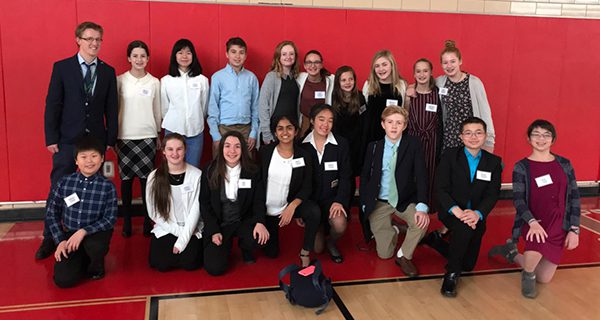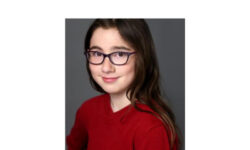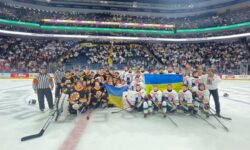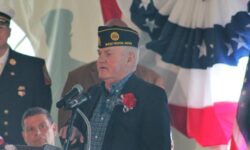In a time when so much debate and discussion is taking place on social media platforms, one teacher at Thurston Middle School is working with students to do it differently. Nicholas Akers teaches seventh grade social studies and is the advisor to the middle school’s Model UN. The program is more commonly seen in high schools – including WHS – but in its first year at Thurston, it’s proven to be a success.
“Allowing these younger students to take part in this program at an earlier age is a great opportunity to expose them to everything it has to offer,” said Akers.
That opportunity was fully realized when the group travelled into Boston in November to take part in the 7th annual Model UN Climate Change Conference. The team performed well enough that three Westwood students were honored with an Outstanding Delegate Award for their opening statements and negotiating skills.
Each of the participating students was assigned a country to represent. This required they research that country and, based on the real world issues it faces, come up with a plan that would address climate issues. On the day of the event, students gave prepared opening statements and then were broken into groups with other “countries” to begin their negotiating.
“The negotiating was one of the most important parts of the event,” said Akers. “With the rise of social media, so many kids are engaging in anonymous debate. This exposes them to the right way to have these sorts of discussions.”
Sonali Gopal joined seventh-grade classmates Olivier Homiller and Jess Wang in being recognized as outstanding delegates. Gopal echoed her teacher’s view on the bigger picture purpose of the negotiations.
“It teaches me about communication and compromising,” she said. “These skills will help me become more confident. I also learned both to respect other ideas and how to share mine."
These are some of the reasons Akers wanted to bring the Model UN program into the middle school. In his experience, it teaches kids both the skills and patience to listen to each other. When students are forced to put themselves in another’s shoes, he believes they gain a new perspective.
“The event included kids from a lot of different schools, backgrounds, and ethnicities,” he said. “The Model UN helps them to learn how to challenge another person’s view respectfully.”
In addition to these big-picture goals, the format of the event also helped reinforce other important life – and school - skills. Participants were required to do extensive research prior to the conference and had to prepare and present compelling opening statements in front of a group.
“The committee was a really fun experience for me,” said Wang. “Model UN is teaching me many things about public speaking that I wouldn't have learned otherwise."
It was after the conference was complete and on the bus ride home that Akers got to see how his students reacted to the day. Many recounted examples of how their negotiations convinced others to see their point of view. But, the students also reconsidered those moments when their arguments fell flat. While most were happy to talk about the instances in which they won an argument, at least one boy was willing to admit otherwise.
“He ultimately changed his mind on something he supported when the day began,” said Akers, who noted the challenge for kids not to take the discussions – and losses – personally.
Akers said parents have thanked him for giving their kids this opportunity. They’ve reported seeing positive developments in their own children which they credit directly to their Model UN experience.
“Hopefully we’ll see less of that visceral, aggressive reaction that dominates debate today,” he said. “There’s a better way to challenge another person’s view and that’s what I hope we can take away from this.”

























